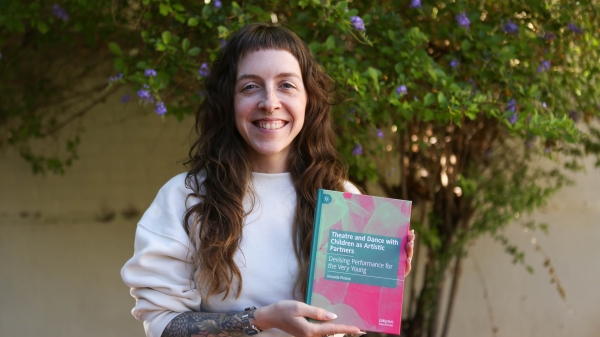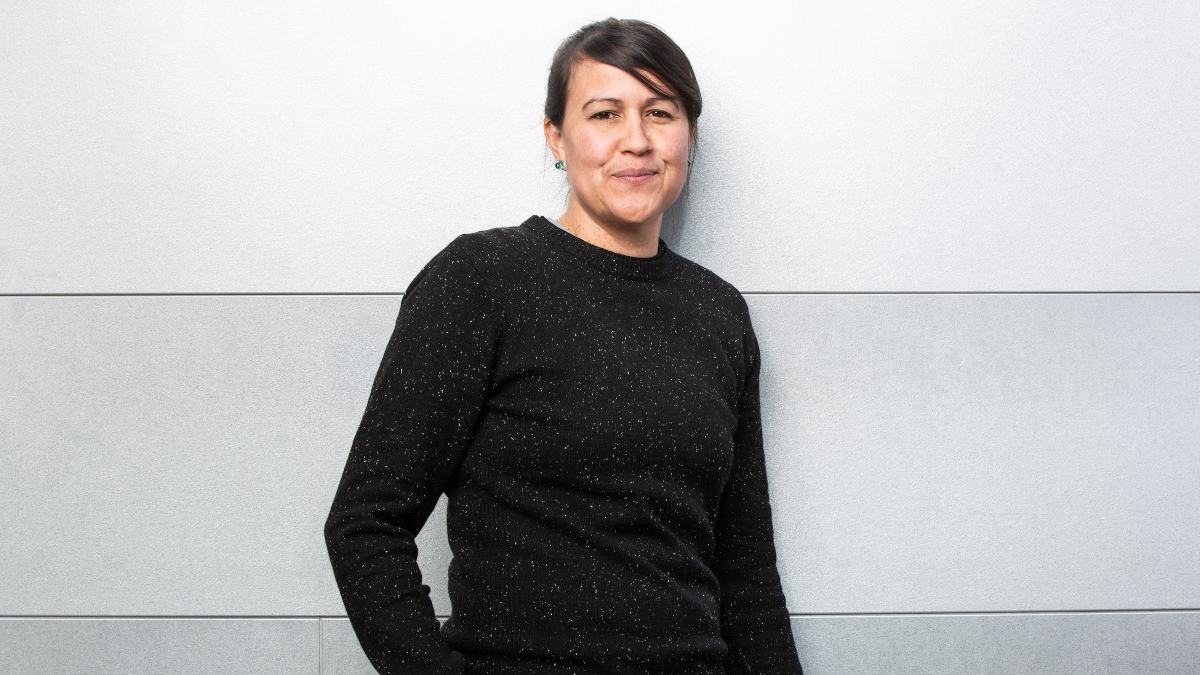Topping the headlines again, Arizona State University Associate Professor Natalie Diaz has been awarded the 2021 Pulitzer Prize in Poetry for her collection “Postcolonial Love Poem,” which has been described as “an anthem of desire against erasure.”
The honor comes mere months after the MacArthur Fellow made history by becoming the youngest chancellor ever elected to the Academy of American Poets.
“I care so much for the book and for the people that the book has brought me to, but also for the people I hope the book could carry of my life, you know, of my beloveds and my strangers,” Diaz said. “And so in a lot of ways I don't think I've ever felt this way about a prize before, whether it was winning a championship or some of these other prizes — in some ways I feel like the things I'm trying to fight for in language, this was a kind of recognition that I know that they matter even if it's in a small way.”
ASU President Michael M. Crow shared the university's congratulations, praising the poet's work.
“There is unbelievable power when intelligence, creativity and insight fuse together,” Crow said. “That’s what Natalie Diaz brings to language and poetry, and her voice is incredibly important. This Pulitzer Prize is very well deserved, and the ASU community celebrates this profoundly good news with her today.”
RELATED: Diaz on her path to poetry
The winners for the prizes in journalism and the arts were announced at a remote ceremony June 11.
“At ASU we have an incredible community of Native students and staff and faculty, but often when you leave Arizona you're definitely the only Native in the room and it was incredible to be in that, quote, 'Pulitzer room' with two other Natives,” said Diaz, who is Mojave and an enrolled member of the Gila River Indian Tribe. “So that I think that's also a part of what makes this feel good is that I feel like in some ways our worries and our loves are being brought to bear in the larger literary world and journalistic world.”
The “two other Natives” she referenced are Louise Erdrich, who won the prize for fiction for her novel “The Night Watchman,” and Marty Two Bulls Sr., who was nominated in the journalism category of editorial cartooningPolitical cartoonist Lalo Alcaraz, the ASU School of Transborder Studies' first-ever virtual artist in residence, was also nominated in the category of editorial cartooning. There was no winner awarded this year..
“Natalie represents the best of what the humanities at ASU can achieve,” said Jeffrey Cohen, dean of humanities in The College of Liberal Arts and Sciences at ASU, where Diaz serves as the Maxine and Jonathan Marshall Chair in Modern and Contemporary Poetry.
“She is an international leader for creative engagement with and deployment of the power of language to bring about a more just, compassionate and capacious world,” Cohen continued. “Working with her has been a true honor, and I honestly cannot think of a work more deserving of this recognition than ‘Postcolonial Love Poem,’ a book I find myself frequently returning to for inspiration and provocation.”
Last year, Diaz launched the Center for Imagination in the Borderlands at ASU, an initiative she hopes will spark inquiry, action and a reimagining of what America’s borderlands can be.
“I’m so excited about it. I think it can make an impact on the ways we think about Indigenous art and scholarship, as well as the ways we practice collective and relational imagination,” Diaz said in a January 2021 interview with ASU News.
Natalie Diaz reads "Postcolonial Love Poem."
As a child growing up on the Fort Mojave Indian Reservation, a roughly 24,000-acre plot of land that straddles the boundaries of California, Arizona and Nevada, Diaz spent much of her time engaging in two of her favorite activities: reading and basketball.
The sport was more than just a pastime for Diaz. It was a source of pride, as well as opportunity. She played throughout high school and college before a torn ACL derailed her basketball career but led her to one in poetry.
Diaz grew up in a family of storytellers, most notably her mother, whose enthusiastic readings of library books Diaz credits for her initial appreciation of the written word. She published her first poetry collection, “When My Brother Was an Aztec,” an American Book Award winner, in 2012. Her second collection, “Postcolonial Love Poem,” published in 2020, was a finalist for both the National Book Award and the Forward Prize in Poetry.
RELATED: Creative writing students read from Diaz's work
A number of accolades have been bestowed on Diaz over the years, including a Lannan Literary Fellowship, a Native Arts Council Foundation Artist Fellowship, a Bread Loaf Fellowship, the Holmes National Poetry Prize, a Hodder Fellowship, a PEN/Civitella Ranieri Foundation Residency and a U.S. Artists Ford Fellowship.
"The Department of English at ASU is honored to count Natalie Diaz as one of our faculty members," said Krista Ratcliffe, professor and department chair. "Her care for her craft, her communities and her students comes through in every endeavor she undertakes, including her brilliant book 'Postcolonial Love Poem,' which is most deserving of the 2021 Pulitzer Prize for Poetry."
Diaz joins seven other Pulitzer Prize winners among ASU's faculty. She is the second to receive the award while a faculty member here; the first was former U.S. poet laureate Rita Dove, who won in 1987, also for poetry.
Suzanne Wilson contributed to this article. Top photo by Deanna Dent/ASU News
More Arts, humanities and education

Exhibit to feature artwork inspired by oral histories from Arizona's oldest botanical garden
Though it is Arizona's largest botanical garden and has been an established touchstone of the community for more than 100 years, many students in Arizona State University Professor Ellen…

ASU center to host Spike Lee for Delivering Democracy 2025 program
The Center for the Study of Race and Democracy at Arizona State University will host Academy Award-winning filmmaker and cultural icon Spike Lee on March 1 for its annual Delivering Democracy…

ASU professor explores theater, dance for young children in new book
Arizona State University Assistant Professor Amanda Pintore believes in the artistic capacity of very young children. She's hoping to spread that awareness to others with the recent publication of…
